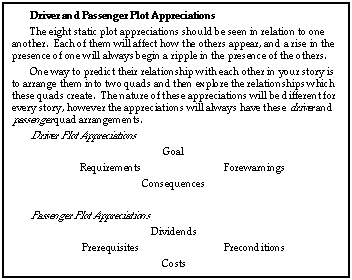A story’s Goal is most often found in the Objective Domain for stories written in our culture. Aside from that bias, the story Goal might just as properly be found in any of the four Domains. As we now consider how to select the Goal for our story, we need to know a little bit more about what a Goal really does for an audience, and what kinds of control over our audience we can exercise simply by choosing where we place the Goal.
An audience sees a story’s Goal as being the central objective of the story. As such, it will be of the same nature as the Concern of one of the four Domains. Which one depends upon which throughline an author wants to emphasize in his storytelling. For example, suppose your Main Character and his experiences are the most important thing to you, the author. Then you will most likely want to make the Main Character’s Concern your story Goal as well. On the other hand, if your story is about a problem that is affecting everyone, you will probably want to make the Objective Story Domain Concern your story Goal.
Each throughline will have its own Concern. When the audience considers each throughline separately, it will focus on that Concern as being the principal objective from that point of view. When the audience considers the story as a whole, however, it will get a feel for which throughline is most emphasized by the author’s storytelling, and will see that throughline’s Concern as the overall story Goal.
Since emphasis is a gray-scale kind of process, the story Goal may appear to be a highly focused issue in some stories and of lesser concern in others. In fact, all four throughlines might be equally emphasized, which would result in an audience being unable to easily answer the question, what was this story about? Just because no overall Goal is identifiable does not mean the plot necessarily has a hole. It might mean that the issues explored in the story are more evenly considered in a holistic sense, and the story is simply not as Goal-oriented. In contrast, the Concern of each Domain must appear clearly in a complete story, for Concerns are purely structural appreciations which are developed through storytelling, but not dependent upon it.
When selecting a Goal, some authors prefer to first select the Concerns for each Domain. In this way, all of the potential objectives of the story have been pre-determined and the author then simply needs to choose which one to emphasize. Other authors prefer not to choose the Goal at all, since it is not truly an essential part of a story’s structure. Instead, they select their Concerns and then let the muse guide them in how much they emphasize one throughline over another. In this way, the Goal will emerge all by itself in a much more organic way. Still, other authors like to select the Goal before any of the Concerns. In this case, they may not even know which Domain the Goal will ultimately be a part of. For this kind of author, the principal question they wish to answer is, what is my story about? By approaching the selection of your story Goal from one of these three directions, you can begin to create a storyform that reflects your personal interests in telling this particular story.
There are four different Classes from which to choose our Goal. Each Class has four unique Types. In a practical sense, the first question we might ask ourselves is whether we want the Goal of our story to be something physical or something mental. In making this decision we are able to limit our available choices to Universe/Physics (physical goals) or Mind/Psychology (mental goals). Instantly we have cut the sixteen possible Goals down to only eight.
Next we can look at the names of the Types themselves. In Universe: Past, Progress, Present, and Future. In Physics: Understanding, Doing, Learning, and Obtaining. In Mind: Memory, Preconscious, Conscious, and Subconscious. In Psychology: Conceptualizing, Being, Conceiving, and Becoming. Some are easy to get a grip on; others seem more obscure. This is because our culture favors certain Types of issues and doesn’t pay as much attention to others. This is reflected in our language as well so that even though the words used to describe the Types are quite accurate, many of them require a bit more thought and even a definition before they become clear. (Refer to the appendices of this book for definitions of each).
Whether you have narrowed your potential selections to eight or just jump right in with the whole sixteen, choose the Type that best represents the kind of Goal you wish to focus on in your story.
From the Dramatica Theory Book



